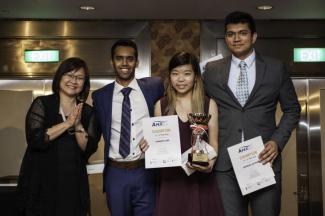
Team S3 Consulting from Simon Fraser University has emerged champions at the 8th APEX Business-IT Global Case Challenge with their proposed solution to reduce traffic congestion, improve drivers’ income and citizens’ quality of life, promote public infrastructure and reduce carbon emissions.
The solution integrates public transportation mode into the existing app, which helps generate optimal mixed-mode routes with the lowest cost, time and/or distance. Additionally, the proposed app featured push notifications to inform drivers of routes with increased probabilities of being hailed or matching passengers to drivers to reduce the possibility of having to travel additional distances for passengers. This helps the on-demand transportation company to do good well.
The competition, organised by SMU and supported by Singapore Pools, was held from 3 to 6 May 2016, and concluded with an Awards Presentation Ceremony held at the Raffles City Convention Centre.
The event was graced by Professor Steven Miller, Vice-Provost (Research) and Dean of School of Information Systems. SMU faculty, staff and partners, as well as a representative from Singapore Pools were also present.
The APEX Business-IT Global Case Challenge is an annual case competition that highlights the intertwined nature of information technology (IT) and business, attracting top upper-year undergraduates from universities across the world. Hosted by SMU from 3 to 6 May 2016, the competition attracted a total of 16 participating universities from North America, Europe and Asia.
Each year, the SMU Case Writing Initiative specially crafts an original case for the competition that reflects specific real-world challenges, difficulties faced by senior executives and implementation challenges in incorporating IT to remain competitive in dynamic business environments. By crafting an original and relevant case, participants are given a unique and intellectually-stimulating platform to learn and apply their IT and business skills to address business problems faced by companies.
The theme of this year’s competition is Conscious Capitalism: Doing Good While Doing Business. Businesses that employ conscious capitalism serve the interests of all major stakeholders, including employees and communities. These companies incorporate social good within their business model and evaluate their performances in a broader perspective to create greater business value.
The four-day event started with a Thematic Workshop which served as an interactive learning platform for panelists comprising senior executives and industry experts who shared industry insights with the participants. Participants gained an overview of the case theme through discussions with the panelists.
Teams were asked to propose a solution that would enable an on-demand transportation provider to utilise their technological platform to do good. The solution would enhance customer relationships by doing social good while demonstrating business value to the key stakeholders (i.e. drivers, customers, investors and other parties in the ecosystem).
The Judging Panel comprised of C-suite executives and management from established corporations in the public and private sectors. The teams were evaluated based on a number of criteria, including feasibility and sustainability.
After four grueling rounds - the Preliminary, Wildcard, Semi-final and Grand Finals - Team S3 Consulting from Canada’s Simon Fraser University overcame stiff competition from five other finalists and emerged as champions.

[Caption: Team Pitbull Consulting from University of Minnesota, which came in second at the competition, proposed two innovations that leverage on the existing technological platform of the on-demand transportation company.]
Team Pitbull Consulting from USA’s University of Minnesota, and AZ Team from Indonesia’s Bandung Institute of Technology, walked away with the first and second runner-up prizes respectively.
First runner-up Team Pitbull Consulting proposed two innovations that leverage on the existing technological platform of the on-demand transportation company. The first innovation aims to deliver rider demand directly to the driver. Passengers could opt-in for notifications on the app for incoming vehicles who are currently hired, but will be free upon arrival. This helps to increase a driver’s revenue and customer satisfaction. The second innovation aims to motivate passengers to spend their taxi ride time to do social good by playing a simple game through the app. Passengers are incentivised with credits that can be used to claim rewards.

[Caption: AZ Team from Indonesia’s Bandung Institute of Technology designed two programmes to alleviate the problems of child trafficking and poverty.]
AZ Team, the second runner-up, designed two programmes to alleviate the problems of child trafficking and poverty. The first recommendation focuses on reducing child trafficking by having parents to subscribe periodically to regular rides for their children, enabling them to track their children’s location during the rides. The second solution focuses on alleviating poverty by providing incubation programs for the drivers to assist them to start a business and support their livelihood.
SMU extends its heartiest congratulations to all the winners and participants of the 8th APEX Business-IT Global Case Challenge, and look forward to welcoming these teams back, as well as new participating universities, for the competition in 2017!
[Featured photo: Team S3 Consulting from Canada’s Simon Fraser University emerged as champions at the 8th APEX Business-IT Global Case Challenge. The team received their top prize from Ms Evelyn Goh (left), Director of Human Resource at Singapore Pools.]